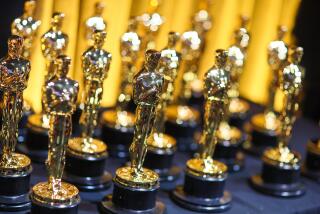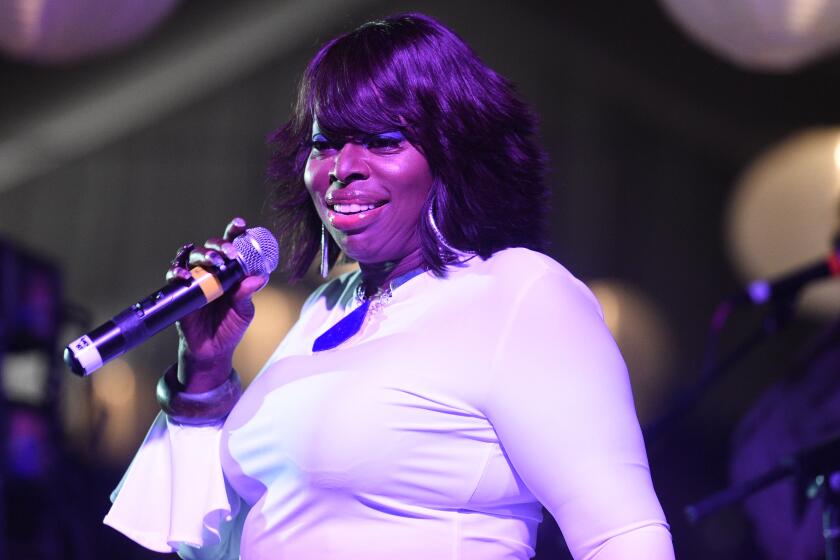Review: ‘Hydrogen Jukebox’ a timely illumination of the American experience
- Share via
“Whatever really great poetry I wrote,” Allen Ginsberg once said, “I was actually able to chant, to use my whole body, whereas in lesser poetry, I wasn’t. I was talking.”
Ginsberg would not have been the same world-changing poet without his inherent musicality. He made American poetry breathe physically and spiritually as it had never before. His ecstatic breath was such that it attracted the varied musical likes of Leonard Bernstein, Bob Dylan, Paul McCartney, Patti Smith, the Clash and the Kronos Quartet. Director Robert Wilson and the late American composer Elodie Lauten are among those who created operas around Ginsberg’s life and work. Ginsberg brought something valuable to them all.
But Philip Glass’ “Hydrogen Jukebox,” a 1990 collaboration with Ginsberg, did something even more valuable. The opera helped the poet himself breathe. And in a new production that opened Saturday night in San Pedro, Long Beach Opera has breathed valuable new life into a startlingly timely illumination of the American experience.
The origin of “Hydrogen Jukebox” is peculiar. At a 1988 benefit for American veterans in New York, Ginsberg excitedly read part of his subversively antiwar poem “Wichita Vortex Sutra” — in which he appealed to Congress to “legislate its delight” and the president to “execute his own desire” — while Glass played a calm piano solo in the background. There was considerable nervousness in the auditorium, but the performance went over startlingly well with the veterans.
Two years later, the composer and poet surrounded this “Wichita Vortex” setting with other texts from Ginsberg’s poems to create a music theater piece for six singers and Glass’ instrumental ensemble. (Glass has gone back and forth about calling it an opera.) Ginsberg suggested a loose set of themes that revolved around peace, the environment, the sexual revolution, Buddhism — all ways that Ginsberg had long proposed to reverse the Fall of America.
In the original production, the singers were dressed as all-Americans: police officer, cheerleader, businessman, priest, mechanic and waitress. That came across as a little overworked, and David Schweizer’s new production for Long Beach Opera does away with all that. Instead, he makes the show all about Ginsberg. (The assistant director of the new production happens to be soprano Suzan Hanson, the cheerleader in the original production.)
The space LBO appropriated is the Crafted at the Port of Los Angeles marketplace, a warehouse. Chairs surround three sides of a performance space, with a screen for projecting the text on the fourth. The poet, an actor dressed in mufti white and sandals, sits at a typewriter atop what looks like a painter’s scaffold on wheels. Six actors in white, who wheel the poet around, portray acolytes. The singers are in black, and they take over the stage floor and three rolling platforms.
Ginsberg carefully thought out the dramatic progress of his libretto, contrasting big themes, such as his howling about all-consuming industrialization destroying the planet and the psyche, or all-consuming religious conflict in the Middle East, or personal concerns. The latter include a night with his lover, Peter Orlovsky, in Kolkata, or standing naked as a boy in front of his Aunt Rose.
Schweizer’s approach appears to be more stream of consciousness. Schweizer changes the order of some songs and moves “Wichita Vortex” from its central position to a climactic place near the end.
We are essentially inside Ginsberg’s head. An excellent cast simply acts out in gestures what the words imply. Glass’ score enhances every word it touches, the way the perfect spice brings out flavor in food. Schweizer asks no more than Ginsberg come to life.
What then comes to life are the concerns of modern life. And what Ginsberg prophesied about the Middle East clash of gods, about gay liberation, about the menace of a society besotted with robotization, about the CIA and about the environment, are today’s daily concerns.
But the touching parts of “Hydrogen Jukebox” are Ginsberg’s revelations about the perturbed and profound trials we all face coming of age and facing death. The final song, “Father Death Blues,” is a powerful, a cappella exit from one realm to another.
As six singers in search of a poet, Jamie Chamberlin, Ashley Knight, Karin Mushegain, Todd Strange, Roberto Perlas Gomez and Jason Switzer each brought something compellingly personal to the performances yet also functioned as an admirable musical and social unit. As the poet, Michael Shamus Wiles read in a voice that somewhat resembled Ginsberg’s, but he lacked Ginsberg’s breath, Ginsberg’s way of packing individual words with so much stress that he was living and breathing them as he spoke them.
A warehouse needs amplification, but that also creates the aspect of robotization against which Ginsberg railed. Well, the electronics failed when needed most, during Wiles’ reading of “Wichita Vortex.” But if industrialization messed up the evening’s climax, that failure only fulfilled Ginsberg’s greater prophecy and wound up seeming like an unintentionally inspired moment.
“Hydrogen Jukebox” is Ginsberg chanting, not talking, and that demands attention. Just the other day, an inspirational teacher in Connecticut lost his job by explicating a sexually explicit Ginsberg poem to a searching high school senior who requested it. Would someone please ship this fine production to Connecticut after its final performances in San Pedro next weekend?
------------
‘Hydrogen Jukebox’
Where: Crafted at the Port of Los Angeles, 112 E. 22nd St., San Pedro
When: 2:30 and 8 p.m. Saturday, 7 p.m. Sunday
Tickets: $49 to $160
Info: (562) 432-5934 or https://www.longbeachopera.org
Running time: 1 hour, 28 minutes
More to Read
The biggest entertainment stories
Get our big stories about Hollywood, film, television, music, arts, culture and more right in your inbox as soon as they publish.
You may occasionally receive promotional content from the Los Angeles Times.











